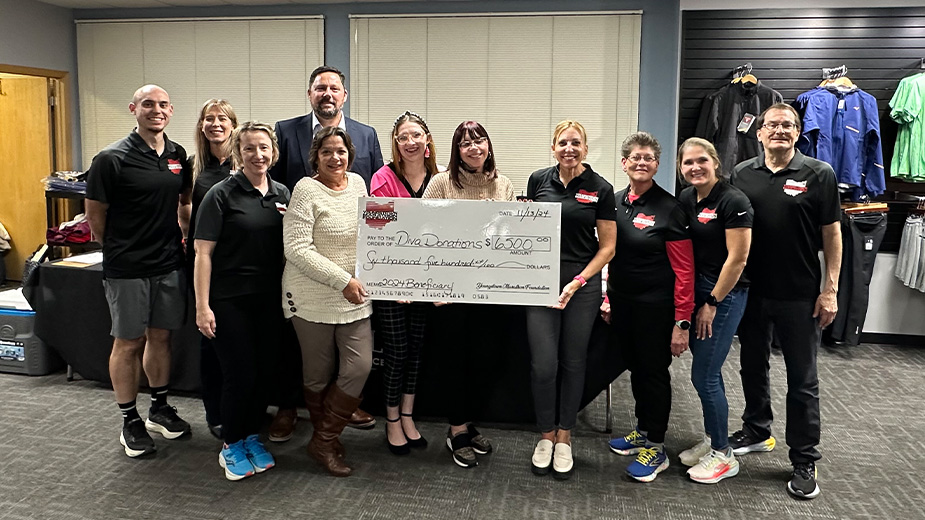York, 49ers Talk the Business of Football
YOUNGSTOWN, Ohio – When you step back and look, the difference between the San Francisco 49ers and most other businesses isn’t as big as it first appears, said team owner and CEO Jed York.
Of course, the 49ers are worth about $990 million – good for 26th place on Forbes magazine’s global list of most valuable sports franchises. So there are a few differences that set the NFL franchise apart from a typical small business. Regardless, York remains concerned about the same challenges that most businesses have to take into account.
“First and foremost, like any organization, you have to be able to work with each other and with the community at large,” he said. “A football team has to do that probably more so than anyone else.”
While most fans simply see the end result of the team’s efforts on Sunday – occasionally also Monday or Thursday night – York said it’s the job of the front office to look at the long-term viability of the team. That can include anything from contract negotiations to marketing to the amenities available to players.
“We spend a lot of money on food for our players. There are millions of dollars between food, travel and lodging through the year,” he explains. “To be a top organization and attract the right talent, you have to have the best things for your players. It’s what we spend a lot of money on, but it has a great return.”
Along with York, several 49ers players and coaches were in town Monday to attend a fundraising dinner for the Edward J. DeBartolo Sr. Memorial Scholarship Foundation at Stambaugh Auditorium. Head coach Jim Tomsula, who took the job Jan. 14, said that most of his input to the front office related to business takes the form of player management.
“Our budgets have to do with salary caps and the available player pool. That’s what drives the roster,” he said. “The salary cap is the reason that the team of people we have is who they are. We have to look ahead at where we are as a team and where the cap will be.”
When it comes to deciding who will wear the team’s famous Cardinal Red jersey each autumn, York likens it to assembling an investment portfolio.
“It’s basically building that portfolio. You have to make sure you build a team that is as good as possible, knowing that there will be holes,” he said. “You also have to be willing to let good players go if what they’re asking for is more than what their value. is or if you can’t fit it under the salary cap. Sometimes there are tough decisions, but it can be balanced out with good draft picks or young players.”
On the other side of the bargaining table are the players. Contract negotiations are often the closest a player gets to the business side of an NFL franchise. Veteran tight end Vernon Davis, with the team since he was drafted in 2006, noted that players often have to do what’s best for the team when it comes to reaching a new contract.
“Everyone wants the significant contract and feels like they deserve it,” Davis said. “But if there’s a situation where you want that contract but aren’t getting it, you have to step back and say, ‘OK, I’ll do what’s best for the team,’ and let everything work itself out.”
Tony Jerod-Eddie, a defensive end for the 49ers, added that contract dollar figures reported in the press when a player signs a new contract or has his current one extended aren’t always accurate.
“When you see a four-year, $60 million contract, it’s not really that amount. All that’s guaranteed is your signing bonus and everything else is stipulations on the contract,” said the fourth-year player. “Nine times out of 10, you won’t get all that money unless you’re a quarterback.”
He also said some players don’t take much of a role in the business side of their professional lives.
“That’s what we have our agents for,” Jerod-Eddie stated and dropped the subject.
With the NFL under heavy criticism for how concussions are handled within the league, York and Tomsula both said players have access to quality care. The team uses doctors who work at Stanford University and the team’s chairman, Dr. John York, serves as the head of the league’s health and safety committee.
“You can’t force someone to play this game. I respect guys like Chris Borland who choose to step away,” the CEO said. “We won’t get in the way and make someone play who doesn’t want to. All we can do is make sure we give the guys the best treatment they can get and make sure their questions are answered.”
Borland and several other players have retired from the 49ers since the season ended, most citing mental health concerns that stem from repeated blows to the head common in the sport.
During a press conference before the dinner, Tomsula and York also discussed former Youngstown State University head coach Eric Wolford, who joined the team as an assistant offensive line coach in January.
“I got to know Eric personally through the team coming to Youngstown [to practice] and watching him as a professional,” York said. “I love the northeast Ohio mentality and work ethic. It’s great to have someone like Eric bring that to the 49ers.”
Citing their roots in the Rust Belt, York and Tomsula said the region is dear to their hearts, but not only because of the Valley’s football heritage.
“I crawled out of a steel mill in Homestead [Pa.], so these are my people too. I’m always excited to be here,” the coach said. “I drove up from my mother’s house after sleeping on her couch for a few days. Vacation for me is going home and sleeping on the couch. It couldn’t be any better than this.”
Pictured: Jed York, CEO of the San Francisco 49ers, met with reporters Monday before the annual fundraising dinner at Stambaugh Auditorium sponsored by the Edward J. DeBartolo Sr. Memorial Scholarship Foundation.
Copyright 2024 The Business Journal, Youngstown, Ohio.



